By Casey Rafter
Peter Petty is a Sacramento-based band leader who celebrates swing music with a repertoire that includes jazz, blues, holiday favorites and uproarious big band tunes. His live shows boast a band of about five people when he’s at smaller venues such as Torch Club to a stage full of 20 players when he puts on his annual Christmas blast, traditionally held at The Sofia with a venue change in 2023 to The Crest Theater.
Mike Rodriguez is a local underground mural and wall artist, owner of comic distributor DefBird Comics and comic artist whose art has been seen throughout Sacramento and at the Maidu Museum in Roseville. Rodriguez has also shown his work at Crocker Art Museum. He’s collaborated with the Black Panther Party, ACLU and several other organizations who use his art as a means to convey their message.
Before the heat hit Sacramento, these two strangers faced each other at Philz Coffee on R Street to wax on about each other’s art, creative process, struggles, triumphs and trauma.
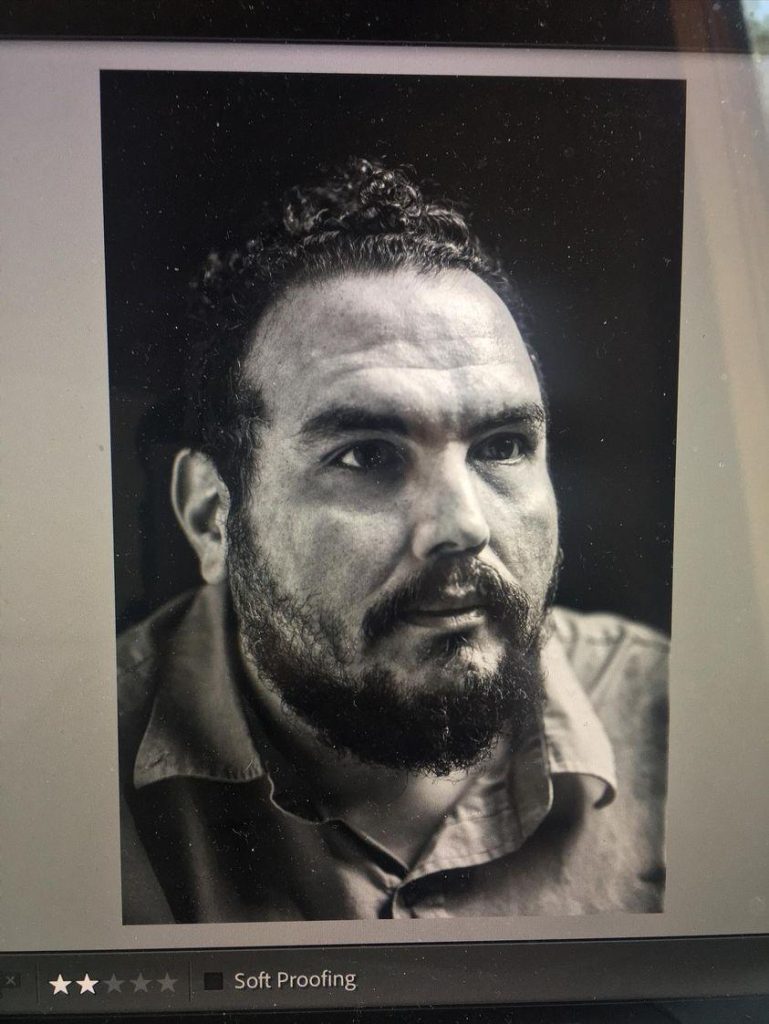
Petty: So my first question to you is: What did you do for your murals that the city only left them to stay up for a limited time?
Rodriguez: Oh! Joe Serna was still the mayor and I did this pretty big [mural]. It basically was about him.
Petty: It was a little critical.
Rodriguez: Yeah. He was trying to set up a misdemeanor boot camp for juveniles. He was trying to make Hughes Stadium —
Petty: I do remember that.
Rodriguez: Yeah, he was trying to make it a bootcamp for tough love. He closed [cruising] down, which just recently got put back up again. It was funny because [Serna] came on like a Chicano kind of ticket. So to do that shit is just contrary.
As far as murals go, like, I think I’ve taught more people how to do murals than actually got them. You know the mural explosion that happened downtown? What ended up happening was one of the kids I helped bring up, he basically just got all his friends and then people he would meet from other towns, got them gigs here, and then all these people that have been trying to get mural gigs, they just got left out. A couple of years ago, there was a huge grant up for grabs. There was a community uproar because, once again, they’re leaving out all like Chicano [artists]. Sacramento has a rich history of Chicano murals. I’m going to be 50 here pretty soon and I still don’t really got any major murals. The ones I was supposed to get got given to people outside the city.
Petty: That irks me.
Rodriguez: It’s Wide Open Walls. … [The organizer] gets people from out of town, he gives them top dollar, and then anybody from Sacramento … it’s nothing.
Petty: It still is inequity, you know. During the pandemic, I worked with Sac State and the Center on Race, Immigration & Social Justice. We spent about a year and the emphasis was so much on opening up these spaces to those that typically cannot get in because … let’s say you don’t have a computer, you certainly don’t have the experience of how to submit applications. We were really edging out the more privileged and the more experienced because the whole idea was to get unexposed artists to be able to expose their art.
But still, there was a jury process and I elected to be on that jury and that was one of the most difficult things I’ve ever done ever. It’s an opportunity to actually do what you’re always complaining about, you know? To give a leg up to those that just don’t don’t know the game and, man, it is a game in so many ways. It was a very conflicting time. On the one side, you want to be like, “Can we just let everybody in?” But … we just don’t have the resources for that. You don’t have the space for that, so it still has to be a competitive bid process.
Because there was such a heightened sense of activism, too, because of it being the pandemic time, because of BLM, you’re really like “Yeah, let’s start swinging.” But you still have to appeal to the city for the grants, so you still gotta step to their tune, because that’s where the money is coming from. …
Rodriguez: I am an artist. I’ve been active in this city. … I don’t have a degree in art or nothin’ — which you don’t need; you shouldn’t need. … I just decided that if I was gonna do art, it would be on my own terms. … But at the same time, why is everybody that gets love and help in this town from somewhere else?
Petty: Case in point: DOCO. You know that … Koons thing. A stupid piglet.
Rodriguez: That guy’s a Wall Street scumbag who never cared about art and he pays other people to do his art for him.
Petty: He’s just so successful, I just can’t even relate to his message.
Rodriguez: He doesn’t have one.
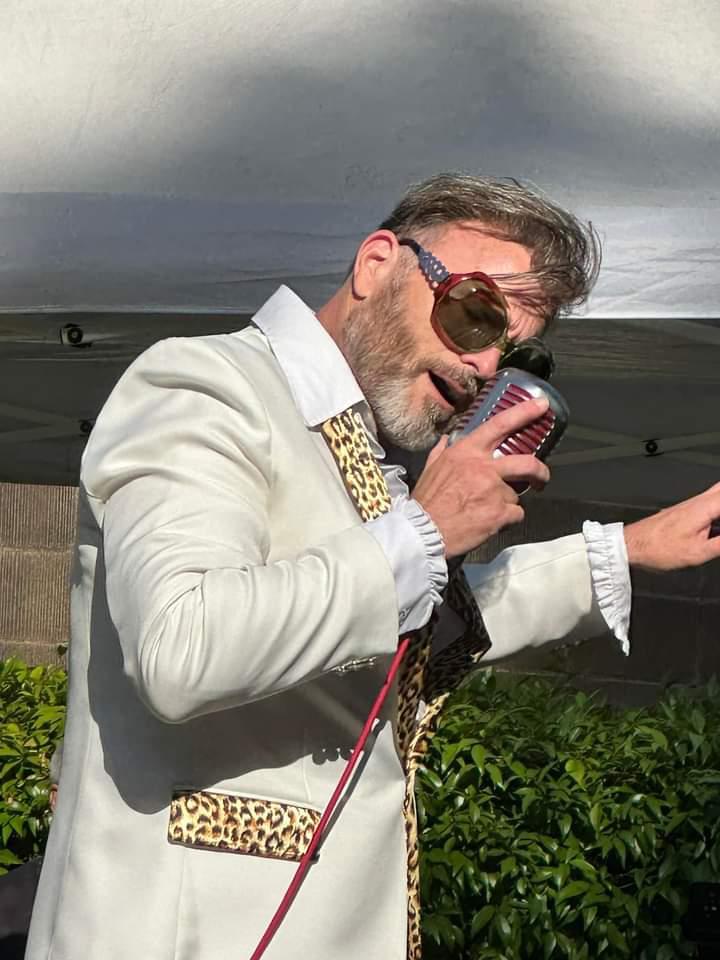
Petty: It seems that way, but I have been trying to suspend my own judgment about others when 99% of the time, I don’t really know. I have my opinions, I’ve developed my prejudices. Usually, any odor of corporate sycophantism, then I go the other side and dismiss, which is also not fair.
I’m so aware of my white, cis-gendered, male privilege, even though the one thing I never had was bread. My family, we were a lot of kids, a little money. I grew up in South Sac when we came out in ‘77. Meadowview and Amherst. It was great to come up there, but I was afraid of getting my ass kicked every single moment of every single day. Once I went out of the house, that’s where my privilege extended: as far as my front door. And then I was a mark and I got my bell rung many, many times. So I have a little tiny bit of insight into that kind of marginalized thing.
Have you ever doubted your commitment to your artistic pursuits or struggled with sticking with pursuing that passion? Yes. This pandemic. After George Floyd’s murder, I had to reassess everything, because I’ve always felt I am a friend of the marginalized. … That’s me making myself feel better. … I would like it to be that we all are helping each other win. That we’re all raising each other. But the truth is, that’s not usually the way it goes.
So when you say “It’s never going to change,” I feel the same way, but then I have to be like, “No, no, no.” … The overall sense of concern for a single human life is greater than it’s ever been in our society. We have a responsibility to make this more accessible for those that are coming up behind us.
Rodriguez: You were saying earlier “You can’t give up.” That, I think, shows our power of not giving into power. The power has to emulate that outside shift going on that’s contrary to its own existence. … Culture always copies art that comes from poverty. It seems like that.
Petty: It is that.
Rodriguez: It comes from the lack of representation or ever getting any kind of possible representation through power — power in this case being galleries, being museums. It’s ridiculous to go in there and see a piece anti-slavery, anti-fascism art pieces, but then you had to pay fucking $20 to get in here. … Which makes me question again the validity of any artists these days. … They have to do that because of perhaps their own inauthenticity. And it’s not a matter of talent.
I think it’s important to teach kids that where it’s at is not galleries. … Whatever you want it to be, just get it out. A lot of punk rock aesthetic like making your own zine, making your own stickers. Everything’s so much easier and cooler now that we have computers.
Make your own underground sensation. You just gotta train yourself not to expect or even want the same prize or carrot on the end of the stick. As an artist, for me, sanity. Being able to function and being happy because I satisfied my artistic expression. That’s addictive.
I love music. You, as a musician, I can only speculate the feeling you must get from coming up with an idea and getting just a part of it done. Are you orchestrating music?
Petty: Oh, yeah.
Rodriguez: I’d imagine that’s even more satisfying.
Petty: Well, when you actually have your own idea and can actually have it come to any kind of fruition, it is satisfying. It’s also tremendously frustrating if you can’t get what you want to get out there. There’s a true delight in that as well. But, the better you get, the more elusive that itch scratch is. … You’re just getting less satisfied with what “better” means. So much of it is that opportunity. How are we going to afford the opportunity to those who are kept out of those spaces. To have that same creative process, to have that same rush of hearing what you did come back at you.
Rodriguez: I was just reading that a Seattle judge just made a ruling that the city wasn’t able to charge anybody for defacing public property [that graffiti injunction has since been clarified]. I wonder how long that will last. Even if it doesn’t last, the fact that it happened is something to speculate on. We both know it’s gonna pop up again. Hopefully here. I mean, this is the capital of California. I have a feeling that could change things to the point where galleries and museums are gonna be a thing of the past.
Petty: As a repository of art, these places are important. I don’t think they need to be dismantled, but the access is what needs to be reoriented. These are for the people, man. When the people can’t go into them, for whatever reason, then we have a real problem.
Rodriguez: You’re right and I agree with you. Art can change people’s opinions. It could change how they feel.
Petty: Art does change people.
Rodriguez: But I think what needs to happen is already happening whether we like it or not: People are going to express themselves regardless of whether or not we let them or if they can afford it or if they know how to write a grant or proposal.
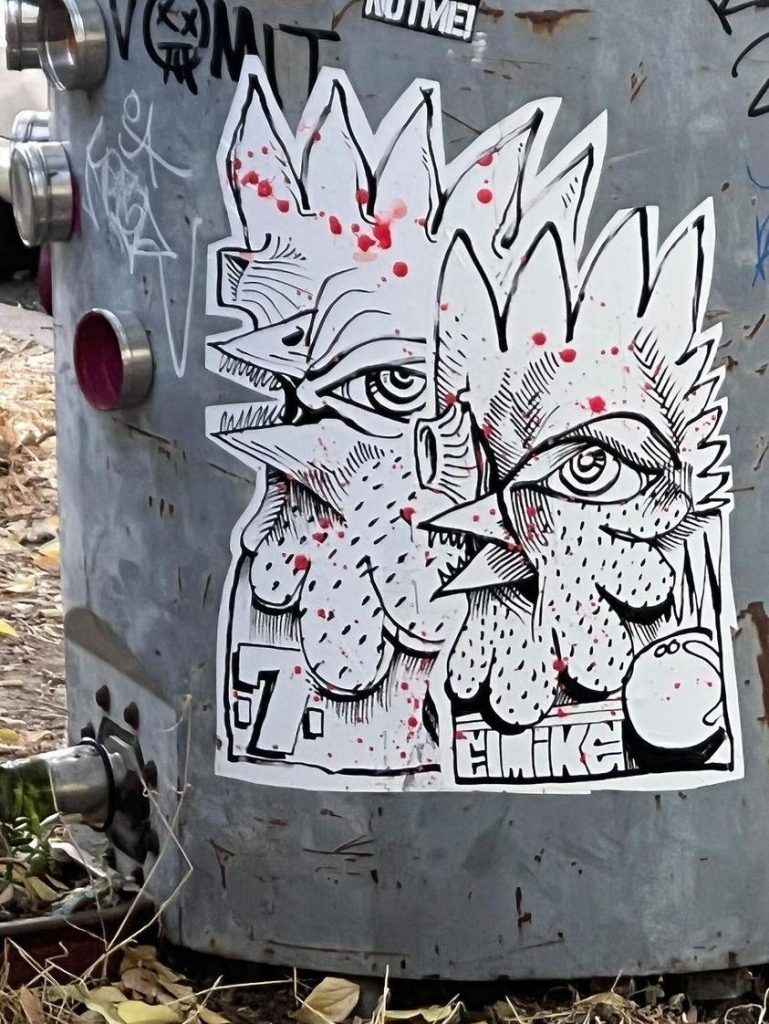
Petty: It’s one thing to feel your white guilt. The question is, is it even ethical or moral that I should have a voice in this conversation? Should I just step aside and let somebody else take the microphone?
Rodriguez: I think what Malcolm X said about neoliberals is so true and it’s something I experienced growing up out in Rio Linda. … What Malcolm X was saying was that white supremacists, they’re so proud of themselves, they’re gonna be honest with you. … Whereas, say, with a neoliberal or democratic or whatever, they feel the exact same way, except they’re pretending they’re not. I know that’s a generalization.
It’s like who can you trust more: somebody who’s honest about their white supremacy, or somebody who’s acting like they’re not?
Petty: My brother, smiling faces tell lies. You go to the whole point of my own sense of wanting to be — driven probably by my religious upbringing — I want to be righteous. I don’t want to be helping the wrong thing. I don’t need to be leading the mob or nothing. To me, rightness is justice. Because of these reasons, I pine for equity. And still, I’m just trying to keep my ears open and learn what I can, because I got so many blind spots.
Rodriguez: Your type of music, is it jazz oriented?
Petty: Yes, it is jazz oriented. I mean, it is Black American music. … Until Black Lives Matter, I was thinking it was less of an issue than it is because of the brotherhood, the personhood of the jazz scene. Playing with all these cats; so many colors and it just never even was an issue at all. But because of these things, I wanted to make sure that I was trying to give back. I’m not good at giving back, because I don’t think I have that much to offer back. You don’t just want to be giving this lip service. You’ve got to be actual service to the people. So taking that seriously, I joined … social justice-minded collectives.
Rodriguez: It’s easier to work by yourself as a visual artist. Or maybe it’s not, but I do that. You’re in a very unique situation because you’re working with other people and because you’re doing something that a lot of people don’t have to do these days. There’s something to that and I think it gives you more skin in the game, if anything.
Petty: Yeah, I can appreciate that.
Rodriguez: What happened that caused you to shrug off adversity and stay the course?
Petty: I was experiencing some debilitating malaise when it came to my identity. I got into therapy, still am in therapy. … I have so many of my own issues and my own inabilities to address that, which I need to in so many ways, to really become who I would like to be. When I was at my downest, it wasn’t an option. It was just like, “Jesus Christ. How do I claw my way out of this? I don’t think I’m able to.” You’re not thinking good thoughts, but also you realize, I was still feeling this sense of latent purpose and knowing that I am not serving anybody by wallowing, to a degree, in a pitiable state about yourself. It’s very narcissistic to feel like “Because I can’t get up, that means I’m just no good to anybody.” You still got your people, if you’re lucky enough to have them. I got family; I got a son. What example are you going to set?
I get really mired in injustice and equity in this world. And again, I feel like, more than any other time in prior human history, we have more concern for the value of human life at large and even the value of a single human life. So many of us do, anyway. … We care. We see ourselves in others and we know that more and more people know that anybody has just as vital and as real a life as they do.
The machinations of keeping the poor poor. I think even more than a racial situation, it really is
an economic one.
Rodriguez: Yeah, you’re right. It’s a class thing. That’s why it’s so important [to certain parties that] they keep racism alive or they’ll be out of a job. [Next question:] Painting, seeing and creating, why do you do it?
Petty: I do it because that’s what I can do.
Rodriguez: Because you were talking about depression, which I have; I had the same issues — do you find that the art helped?
Petty: As a therapy? Yes, of course, because when you’re doing it, you’re not really as up in your head as maybe you would be.
Rodriguez: Have you ever been moved by your own work?
Petty: I recorded a Christmas EP and I brought it home to my parents; this was during COVID lockdown. My dad had broken his hip about a year prior, but didn’t know he broke his hip. My mom was so worried that he was going to get COVID if she took him to the hospital that she just kept him in bed for a year and he was 85 at the time. He just passed away last year, bless his infernal soul; I think about him all the time. I love him.
I got the CDs back and I brought them over to my folks. I played it and there’s this one song, it’s a Christmas song by Nancy Wilson, she was a jazz artist who came to prominence in the late 1950s early 60s. She had a beautiful voice, just one of my favorites. So I’m playing it for my parents and they are totally moved by it, which of course then I’m watching them and I’m listening and I’m feeling the emotion that drove me wanting to include this song. Before I know it, we’re all sitting there crying over it.
Rodriguez: That’s rad.
Petty: Have you ever been moved by your own work?
Rodriguez: From 18 all the way until maybe 20 years ago, I worked with the Black Panther Party alumni here in Sacramento. I got to meet a lot of cool people that I actually looked up to. I got to be acquainted with them and get pictures with them. … Just meeting different people that aren’t necessarily famous pop stars, but that are historically badass.
What person, movie, books, songs, art was a catalyst to creating art or performing, if it was a series of things can you pinpoint what kicked it off?
Petty: My own abiding interest in such things. The same reason anybody wants to try their hand at whatever they see as a natural proclivity for them. “Oh, I’m good at this. I just happened to be naturally not bad at this.” And then you give it a shot and if you get a good response, it just emboldens you to do it again and again. I have bombed like you would not believe and that’s very humbling.
Rodriguez: What’s next? Is anything in your way? Are they challenges you’ve experienced before?
Petty: Of course. The whole damn thing’s a challenge.
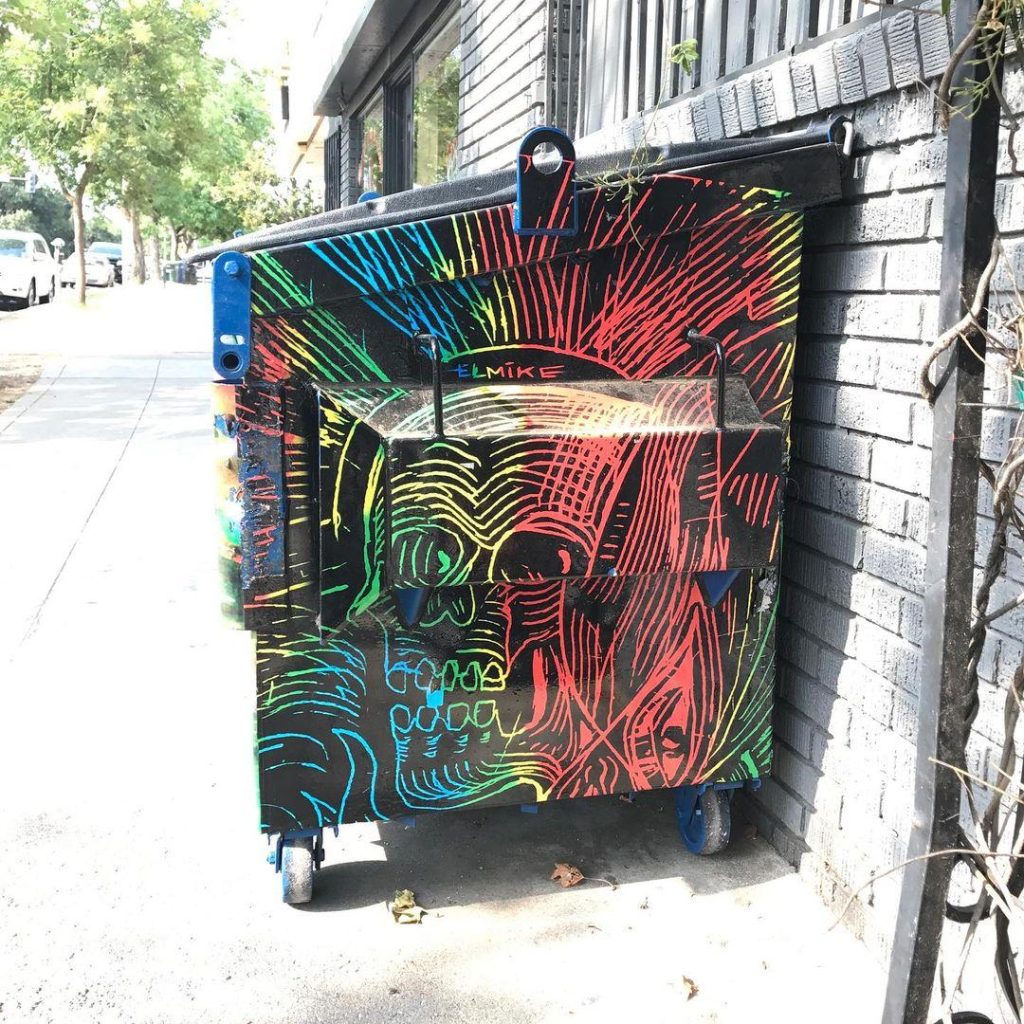
Rodriguez: My daughter goes to McClatchy. I’m doing a little mural. It’s not that big, but, because there’s a colonial representation statute and there’s just little spaces around it. She got me, she says, “Hey, so my dad’s a muralist.” They came up with the idea and the few Native kids that go there and my daughter all got together to do this representation stuff I’m putting it together; then I’m doing another mural for this comic shop out in Carmichael. They’re not really big deals, but it’s kind of cool, I didn’t even ask or try to search it out. They kind of just came to me.
Petty: It’s a sign that you’re doing something right. If you don’t even have to hustle to the degree that I should be hustling, but things still come, you’re doing something right.
Rodriguez: I could do all this stuff (with my art). But as far as what’s fun. Doing realistic portraits is fun, but for me, what’s more fun is what’s fast. Just going straight from your subconscious to whatever you’re getting down.
Petty: I admire an organic effort. I’m not all about cleaning [stuff] up. Not all. I like a live recording. … It is a record of that moment. Why would I want to sanitize this? Why homogenize it? That’s exactly what I’m against.
This conversation has been edited for length, clarity and flow.
This story is part of the Solving Sacramento journalism collaborative. Solving Sacramento is supported by funding from the James Irvine Foundation and Solutions Journalism Network. Our partners include California Groundbreakers, Capital Public Radio, Outword, Russian America Media, Sacramento Business Journal, Sacramento News & Review, Sacramento Observer and Univision 19.

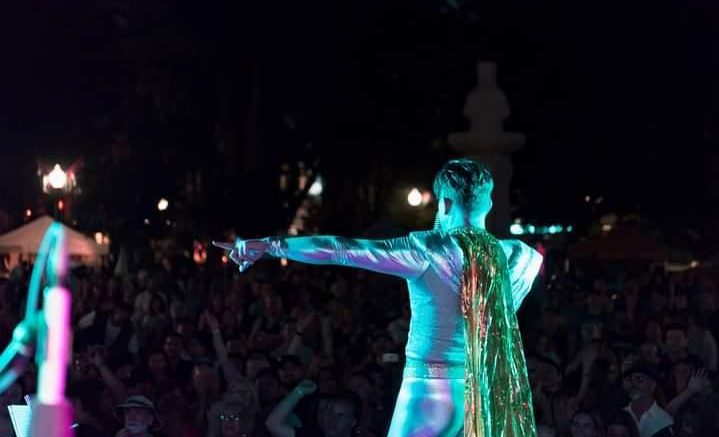
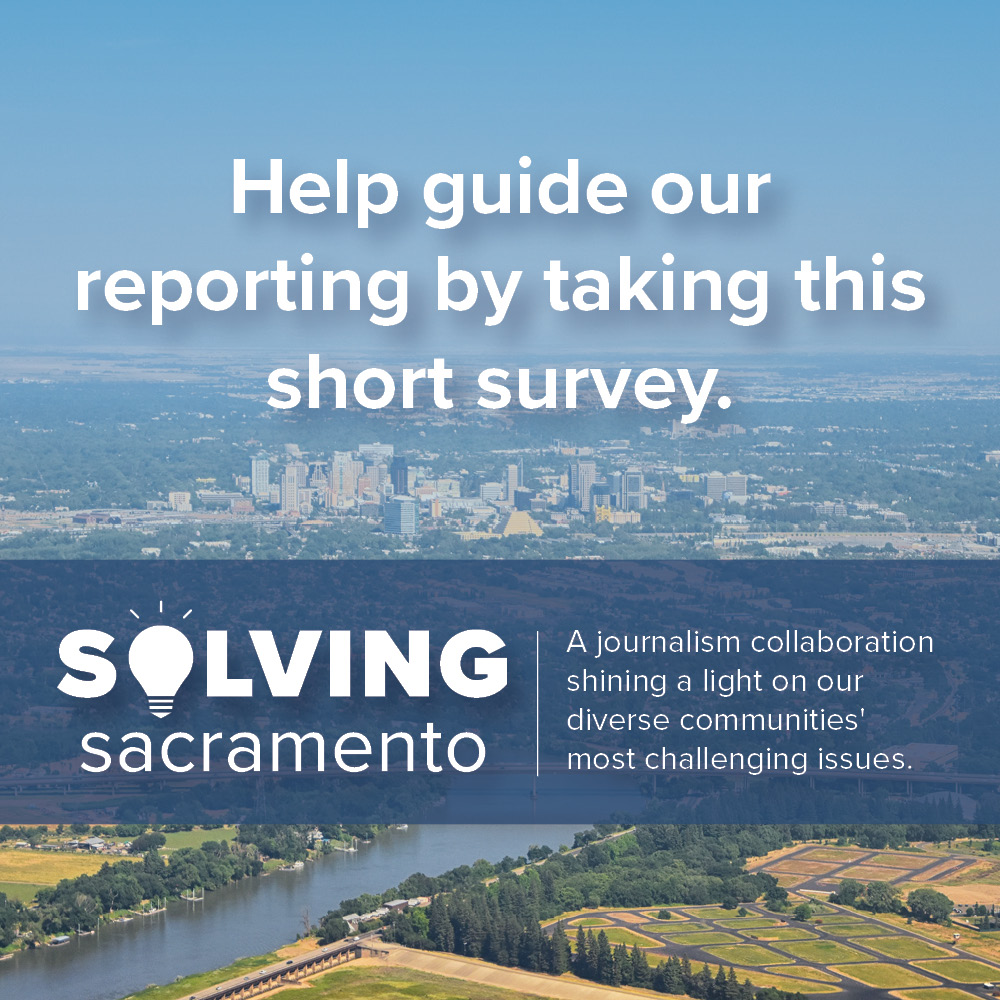

Be the first to comment on "Creativity in the Capital: Sacramento artists Peter Petty and Mike Rodriguez talk about identity, representation and the peaks and valleys of the creative process"